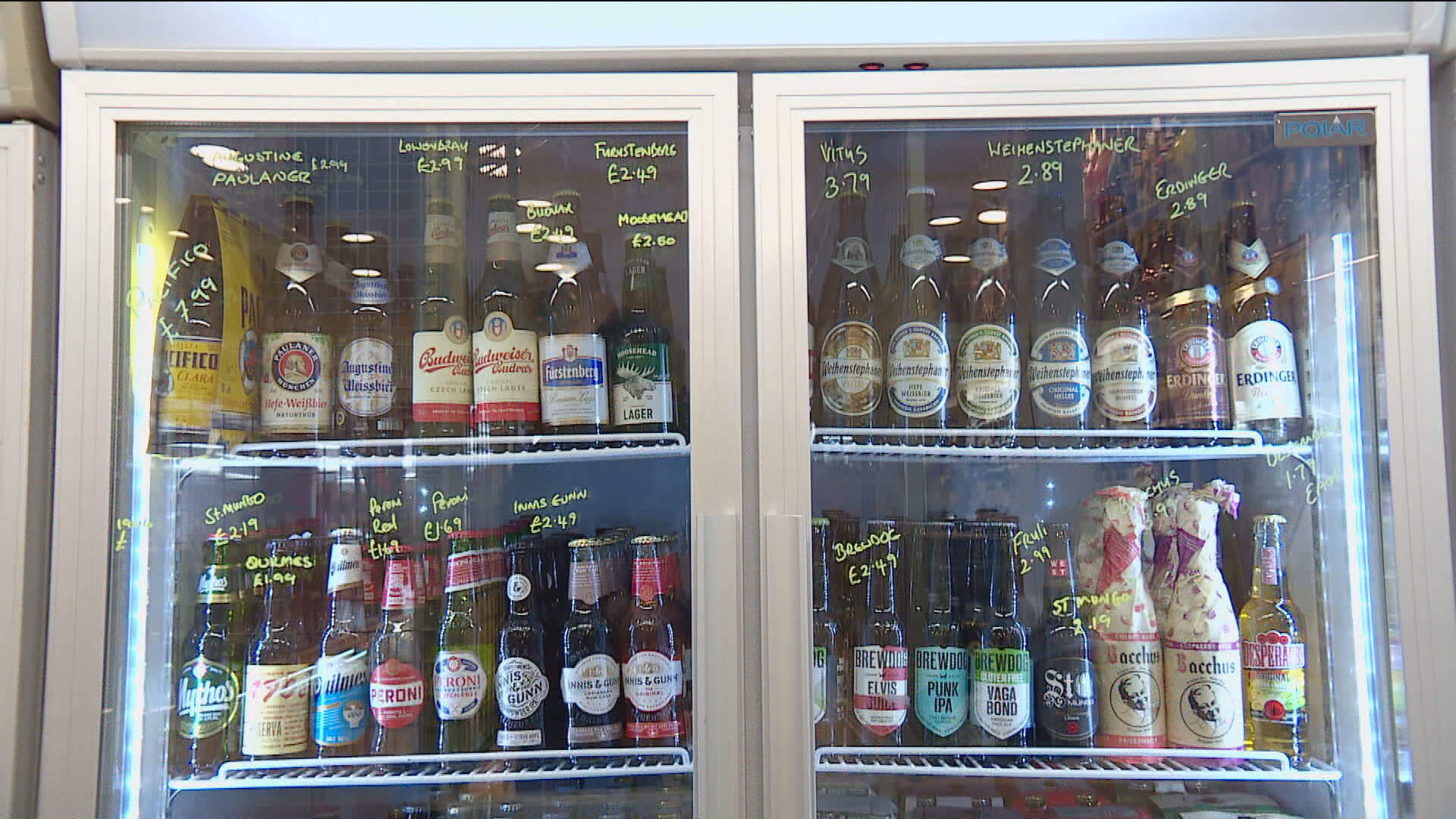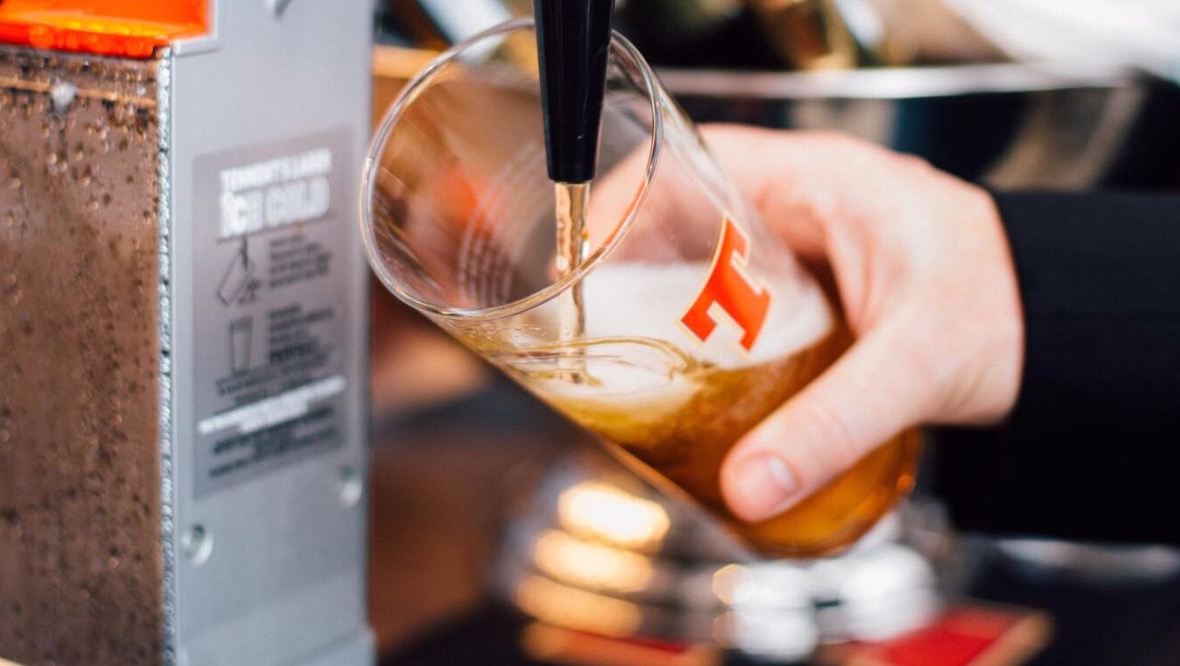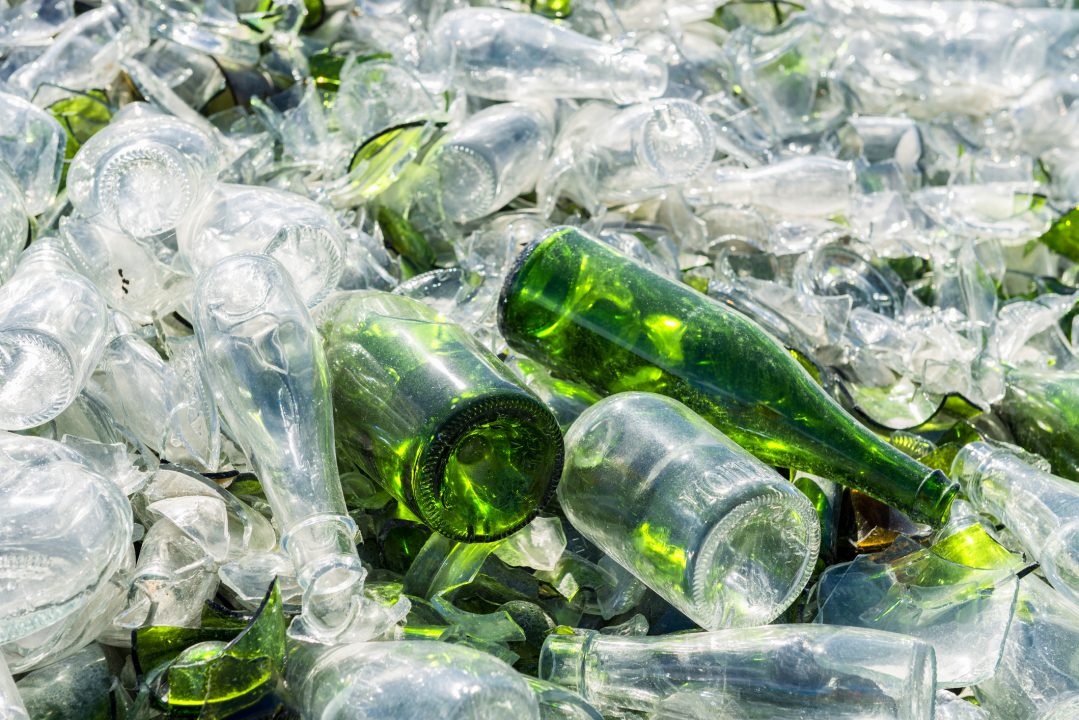Just over 18 months ago, the Supreme Court ruled the Scottish Parliament does not have the power to hold a second independence referendum.
In an already fragile relationship, the mood further darkened between the Scottish Government at Holyrood and the UK Government in Westminster.
The argument over a second vote rumbles on but it’s not the only bone of contention in this most fractious of associations.
First Minister Humza Yousaf has confirmed the Scottish Government will go to court to challenge the UK Government after it used Section 35 of the Scotland Act to block controversial gender recognition reforms passed by Holyrood.
The latest instalment of the feud revolves around Scotland’s proposed bottle deposit return scheme – in particular whether it will include glass.
 STV News
STV NewsYousaf said the scheme could be scrapped if the UK Government does not U-turn on its decision to exclude glass from the Scottish Government’s plans.
The First Minister said options are being considered on how the scheme can progress without damaging Scottish businesses, but if no alternative can be found, the proposals may not continue.
It is yet another constitutional row between the Scottish and UK governments, with Yousaf claiming the move seeks to “undermine” devolution.
The FM met his Welsh counterpart, Mark Drakeford, on Thursday, where Yousaf said they agreed “to work closely to protect devolution”.
During FMQs at Holyrood on Thursday, Yousaf also accused the Conservatives of “shameful hypocrisy” over the DRS issue.
“Whether it’s Rishi Sunak, whether it’s Alister Jack, whether it’s Douglas Ross, they stood on a manifesto promising a deposit return scheme that included glass,” he said.
“The Tory government has U-turned on its very own promises and indeed is going contrary to the evidence of what will help us to tackle this climate emergency, what will help us to increase recycling rates and what will help us to remove that litter, that glass, that can be hazardous to children, to pets.
“But it does not stop at the Tories. Labour in Wales share our anger about the treatment of devolved parliaments, they share our ambition to have glass included.”
Scotland’s DRS is due to begin in March 2024, with the earlier start date forcing ministers to seek an exemption from UK-wide legislation which aims to ensure there are no trade barriers between the four nations.
The UK Government agreed the temporary extension from the Internal Market Act, but insisted the Scottish scheme cannot include glass so it matches the initiative in England, which is due to begin in 2025.
Under plans outlined for Scotland, shoppers would pay a 20p deposit every time they buy a drink in a can or bottle, with that money refunded to them when the empty containers are returned for recycling.
The Scottish Government had previously noted all but six of the 51 deposit return schemes operating elsewhere in the world include glass, adding that forcing Scotland to remove it from its scheme would mean recycling rates for glass bottles remain at an “unacceptable” 63%.
 Tennent Caledonian
Tennent CaledonianThe drinks firm behind one of Scotland’s most known brands, Tennent’s lager, says it believes the removal of glass from Scotland’s DRS would put jobs at risk.
The Daily Record reported that C&C Group had written to Yousaf, expressing “serious concerns” about the UK Government’s decision that any scheme must exclude glass.
The brewer said that would put Tennent’s – typically sold in cans – at a significant competitive disadvantage.
C&C’s position is for the introduction of a UK-wide DRS scheme brought in at the same time across all four nations.
Andrea Pozzi, GB managing director at C&C, warned of “serious implications” for his firm and added: “By removing glass from a Scottish DRS, Tennent’s, as a product sold in can in the Scottish off-trade, would be at a significant competitive disadvantage, undermining our business and therefore placing jobs and investment at risk.
“The removal of glass will also result in a material reduction of consumer choice.
“The announcement further increases the already huge uncertainty around the scheme for the drinks industry, customers, and consumers and, if implemented, would be a fundamental change to the scheme.”
In light of the UK Government’s stance, the British Soft Drinks Association (BSDA) said the “only viable option now” was for a UK-wide initiative to be launched across all four nations in 2025.
Gavin Partington, director general of the BSDA, said: “BSDA members have long supported the introduction of an industry-led, interoperable DRS run on a not-for-profit basis to help support a circular economy, reducing litter and increasing recycling.
“Our members have made significant investments of money, resource and time since 2019 to prepare for the launch of DRS Scotland.
“However, given the level of political uncertainty currently surrounding DRS Scotland, surely the only viable option now is for all stakeholders to commit to launching DRS across the UK on the same timeframe, October 2025.
“BSDA members remain committed to working with the UK Government and Devolved Governments to help ensure DRS can be delivered effectively and efficiently for consumers and businesses alike.”
With similar schemes in the rest of the UK not due to come into effect until 2025, Scottish ministers had been forced to seek an exemption from the UK Internal Market Act, amid concerns trade between the four nations could be impacted.
While Wales will follow Scotland by including glass returns, England and Northern Ireland will not.
As a result, UK ministers argued that having glass in the Scottish scheme – the first UK nation to introduce such an initiative – could create a “permanent divergence” in the market.
Drakeford said he is “considering the implications” of the decision for the Welsh Government.
He told the BBC: “We are considering the implications for our scheme, which includes glass and always did.
“It was part of the consultation we held with the NI executive and the UK Government. At the moment, glass is in our scheme and that’s the way we expect it to stay.”
A UK Government spokesperson said: “The Government remains unwavering in its commitment to improving the environment, while also upholding the UK’s internal market.
“The drinks industry has raised concerns about the Scottish Government’s deposit return scheme differing from plans in the rest of the UK, resulting in the Scottish Government reviewing and pausing their scheme earlier this year.”
“We have listened to these concerns and that is why we have accepted the Scottish Government’s request for a UK Internal Market (UKIM) exclusion on a temporary and limited basis to ensure the Scottish Government’s scheme aligns with planned schemes for the rest of the UK.
“Deposit return schemes need to be consistent across the UK and this is the best way to provide a simple and effective system. A system with the same rules for the whole UK will increase recycling collection rates and reduce litter – as well as minimise disruption to the drinks industry and ensure simplicity for consumers.”
Follow STV News on WhatsApp
Scan the QR code on your mobile device for all the latest news from around the country


 iStock
iStock

























